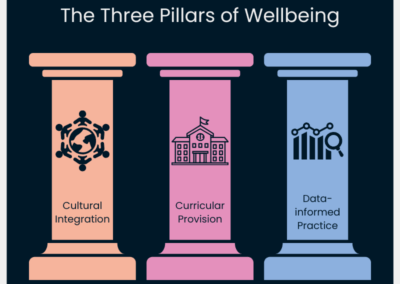The ISC Research Edruptors@School conference, which took place in June, explored innovation, transformation, and balance in international school leadership. Day one of the conference focused on international school leadership for long term strategy. Three panel discussions considered this through different contexts:
- How the sustainable development goals (SDGs) can guide a school’s long term strategic planning
- How leaders can balance business and educational leadership skills to lead and develop a school
- And how school governance can best support school leadership and long term strategy
Grounding the SDGs in schools
In the SDGs session, Andrew Watson, Director of The Jerusalem American School said, “Schools have a very distinct choice, whether they want to be the mirror of society, or the change agents of society…they have to consider the moral purpose of why they exist and act accordingly.” He urged international school leaders to take action, pointing out that there are many groups and people around the world with expertise and experience who want to help schools build networks and partnerships related to the SDGs. “There’s no point planning and planning but not actually getting started,” he said. “Get help… and encourage young people to dream because it’s the possibility of dreams coming true which makes life interesting.”
Principal of United Nations International School Hanoi, Megan Brazil, explained that the school’s mission, vision and values are embedded into daily school life by mapping the SDGs into the school’s curriculum and grounding the SDGs within service learning. “Raising the level of consciousness and developing in our students a passion for being changemakers and global goalkeepers is really easily done with the SDGs,” she said. She signposted schools to the United Nations website to find valuable resources and support for educators on each of the 17 SDGs. Megan described how the school’s SDG week helps to create “a beautiful energy, partnerships across the school, and meaningful, larger than life learning experiences, which complement what we do every week and every month in our school”. She encouraged school leaders to “start small, start now!”
Teacher Laurence Myers at American School of Dubai discussed how the SDGs provide the springboard for students to think of themselves as global citizens and to realise the interconnected nature of the world and our actions. “We’re creating, what we like to call, systems-thinking, service minded citizens,” he said. He challenged all schools to model behaviours that support the SDGs and set an example for their entire community. “It’s not fair, for example, for kids to be told that plastic is bad for you and then walk into the school’s cafeteria where everything is single use. We all need to move together.”
Learning pathways to school leadership
In the panel session on being equipped to lead, educational consultant and former founding Head of English Modern School Alwakra, Dr Lola Wright-Odusoga described the impact of her doctorate in education on her leadership skills. She explained how it armed her with the ability to identify, lead and critically evaluate the school’s big needs, including budgeting, staff retention and allocation of human resources, in line with its vision and mission.
Lee Chalkly, campus Principal of Tenby Schools Ipoh, discussed how studying for an MBA (master of business administration) as a young school leader enabled him to have informed discussions about the school budget, marketing and admissions backed by his experience and understanding of teaching. “Leadership is not one set of schools that you pick up via one course. It’s a process of ongoing learning,” he said.
Jo Evans, Deputy Head of Harrow Haikou, who also contributed to the panel, found benefit from her NPQH (National Professional Qualification for Headship) once she was in a leadership position. However, she said she had gained most leadership development from her school group. It has provided her with a bespoke headship training course, tailoring the course to her needs, and she is supported by a mentor from within the group.
All three leaders emphasised that good leadership centres around an ability to work with others in an empathic, supportive and authentic way. To achieve this, Lee said “it’s about developing yourself and your self-awareness. We have to understand the impact that we can have on others.”
How governance can support school leaders
The third session of day one of the conference asked if international school governance is effectively supporting school leaders. Vanita Uppal OBE, Director of The British School New Delhi, spoke about the critical community networking role that all governors should play. “I see governors as permanent ambassadors of the school,” she said, urging governors and board members to constantly build and maintain important relationships on behalf of the school. Vanita urged boards not to micro-manage but to develop trust and open communication with the school leader and senior leadership team in order to create a strong and transparent partnership. She emphasised this needs to be based on critical friendship and active listening, in a space where it’s possible to respectfully agree to disagree. “The main role of the board is to be future-looking yet supporting [school leaders] now,” she said.
David Axtell, a former parent governor at St Christopher’s School Bahrain provided a more external view. “Most organisations have a board that consists of industry experts, but in the vast majority of schools, that’s simply not the case,” he said. “There are many governors I speak to, particularly those that volunteer, who are unaware they could face personal liability.” He urged schools to undertake a thorough risk assessment to ensure they have adequate protection and indemnification in place up to and including governors and directors. “The board needs to ensure they have visibility of school operations and to work closely with the head of management,” he said.
Ian Hunt, CEO and Chair of Haileybury Kazakhstan, who was also on the panel, expanded upon the comments of Vanita and David. “Each board has to be fit for purpose and that means a range of skills on the board,” he said. He expanded on Vanita’s discussion around trust. “It’s not just trust between the executive and the board, but it’s trust within the board that’s necessary,” he emphasised. Ian raised the subject of leadership wellbeing and proposed a question that all school boards and governing bodies should be asking themselves: “Why would you invest significant sums in your staff and then not ensure that they are supported?”. he said.
For those who registered for the online conference, recordings of all panel discussions are available through the Edruptors@School platform until September.
Thank you to Trutex, Theory of Knowledge, and Outstanding Schools for each sponsoring a day one discussion session.



